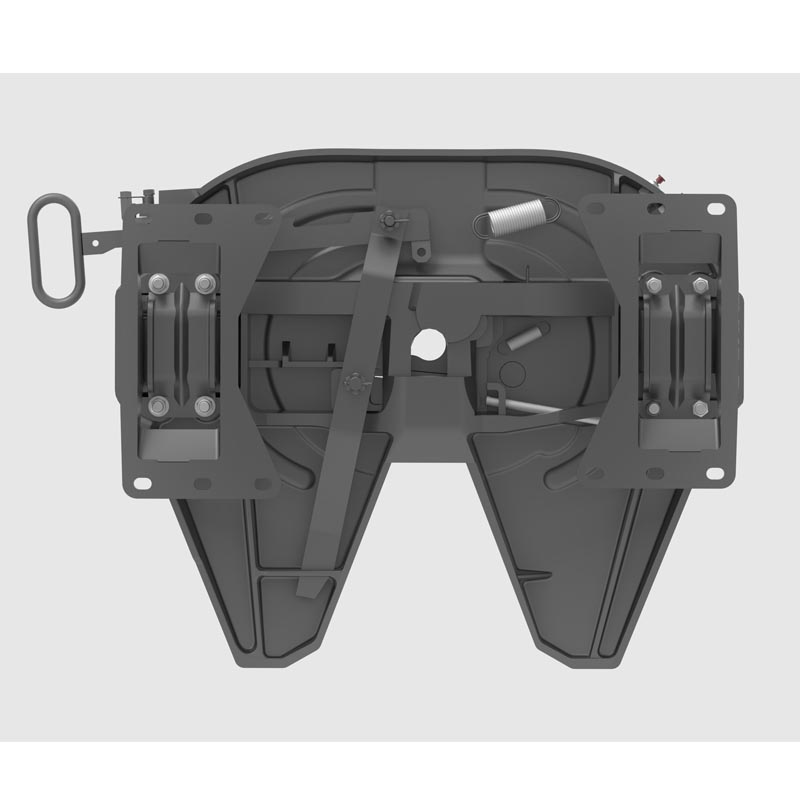Apr. 24, 2024 12:15 Hoʻi i ka papa inoa
ʻO nā mea maikaʻi a me nā pōʻino o ka hoʻohana ʻana i kahi huila ʻelima no ka RV Towing huila ʻelima.
When choosing the type of RV or camper, you will use for your outdoor adventures, it’s important to weigh the pros and cons of the various options available. huila ʻelima ʻO nā mea hoʻomoana he koho kaulana. Inā manaʻo ʻoe ʻo ia ke koho kūpono iā ʻoe, e nānā i kēia mau pono a me nā pōʻino o ka hoʻohana ʻana i kahi pahu huila ʻelima no ka huki ʻana i ka RV.
Kiʻekiʻe JSK hoolei ana i ka lima huila 37C
He aha ka huila ʻelima
One of the biggest distinctions between a fifth-wheel camper and other options is the way it attaches to your vehicle. A fifth-wheel hitch is attached to rails or brackets installed in your truck’s bed over the back axle. Once linked to your truck’s rails, the fifth-wheel hitch couples to the kingpin on your fifth-wheel trailer. The kingpin is kept firmly in place by the hitch’s unique locking jaws. You’ll also see a head plate on which the trailer is supported.
ʻElima-Wheel Hitch Pros
Haʻahaʻa Haʻahaʻa
Fifth-wheel hitches are fairly quiet as you’re driving down the road. Other types of hitches might create a lot of additional noise that can be heard in the cab while you’re traveling. If you’re headed a long distance, this additional noise could get old pretty quickly. A fifth-wheel hitch will allow for more peace and quiet so you can focus on driving or allow and passengers can easily chat amongst themselves.
Huli Paʻa
Fifth-wheel hitches provide a much more stable ride than other types of hitches. Because the weight of the trailer is over the vehicle’s rear axles, it has more stability, and you’ll notice a smoother ride than with other hitches.
Maʻalahi e hoʻokomo
He mea maʻalahi loa ka hoʻouka ʻana o nā huila ʻelima i ka hoʻohālikelike ʻia me kahi hitch gooseneck. Pono ka ho'opa'a huila elima e ho'opa'a i nā ka'a ka'a i kou moena ka'a, a'o ka ho'okomo 'ana i ka gooseneck, 'o ia ho'i ke 'oki 'ana i lua o kou wahi moe ka'a.
Maʻalahi e Hook Up
Nui ka poʻe i ʻike i ka hoʻopaʻa ʻana i ka huila ʻelima i maʻalahi ma mua o ka hoʻopili ʻana i nā ʻano kaʻa kaʻa ʻē aʻe. No ka poʻe hou i ke ola RV a me ka huki ʻana i nā kaʻa kaʻa, maʻalahi ke aʻo ʻana i kēia mākaukau a mālama i ka manawa a me ka huhū e hele mai me ke aʻo ʻana i ka hoʻopaʻa ʻana i kahi trailer.
Kūpono no ka hoʻohana leʻaleʻa
If your main use for a fifth-wheel hitch is pulling your RV or camper, you’ll be happier with it than if you had another type of hitch.
'Elima-Wheel Hitch Cons
ʻO Semi-Permanent ka Paʻa
ʻO ka mea pōʻino, e mau ana nā kaʻa ma hope o ka wehe ʻia ʻana o ka base hitch huila 5. Hiki iā lākou ke paʻakikī i ka hoʻoheheʻe ʻana i nā pahu hana nui i loko a i waho o kāu moena kaʻa. ʻO kēia kekahi o nā kumu nui e noʻonoʻo ai ka poʻe e hoʻohana i nā ʻano hitches ʻē aʻe.
Waihona Moena Kalaka
Ma muli o ka hoʻopaʻa ʻia ʻana o nā huila ʻelima i loko o ka moena o kāu kaʻa, e ʻike ʻoe he liʻiliʻi ka lumi e hoʻopaʻa ai i nā mea ke hoʻopaʻa ʻia ka huila 5. E maʻalahi nā mea liʻiliʻi e hoʻopili a puni ka hitch, akā inā makemake ʻoe e lawe pū i nā mea nui e like me nā kaʻa kaʻa ke hele ʻoe i kahi huakaʻi RV, hiki iā ʻoe ke paʻakikī ke ʻomi iā lākou i loko.
-
Truck Trailer Components and Solutions
NūhouAug.11,2025
-
JSK 37C and Fifth Wheel Solutions
NūhouAug.11,2025
-
Holland 5th Wheel Slider Solutions
NūhouAug.11,2025
-
Heavy Duty Fifth Wheel Hitch Solutions
NūhouAug.11,2025
-
Fifth Wheels and Jost Solutions
NūhouAug.11,2025
-
5th Wheel Solutions and Accessories
NūhouAug.11,2025

